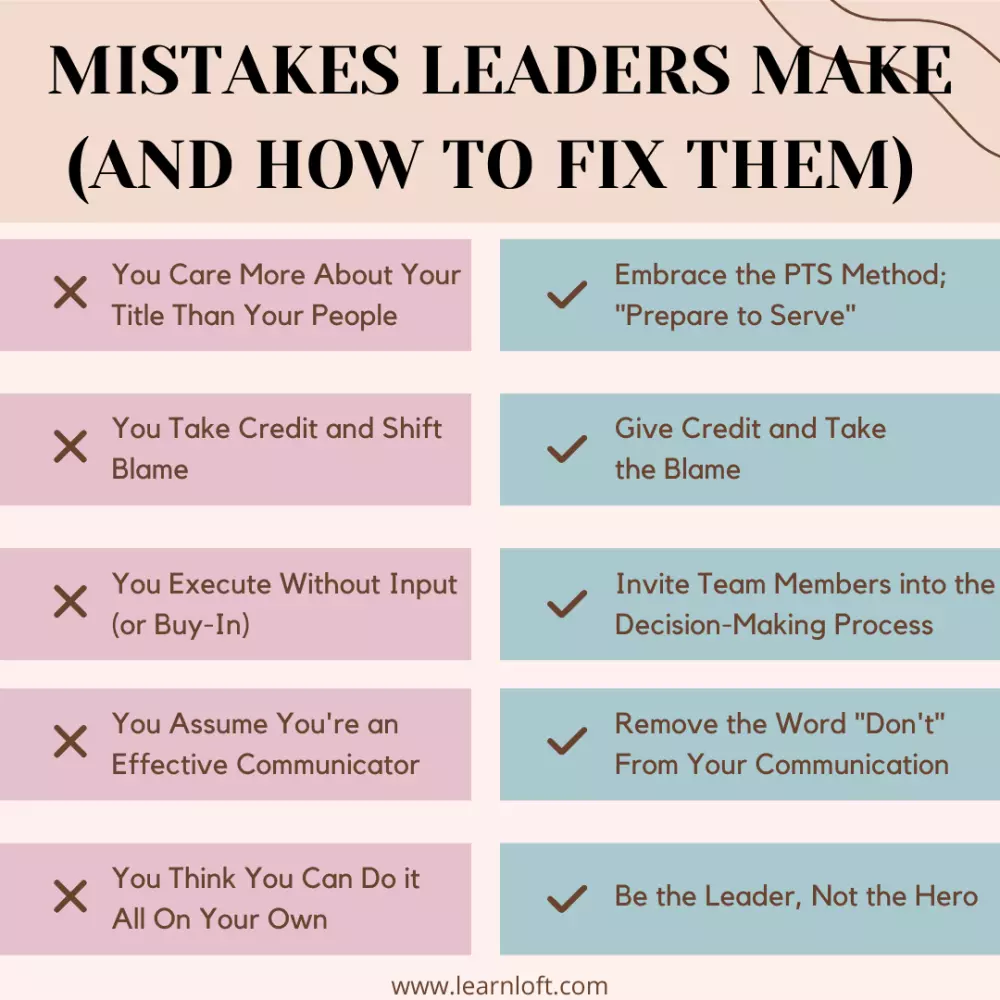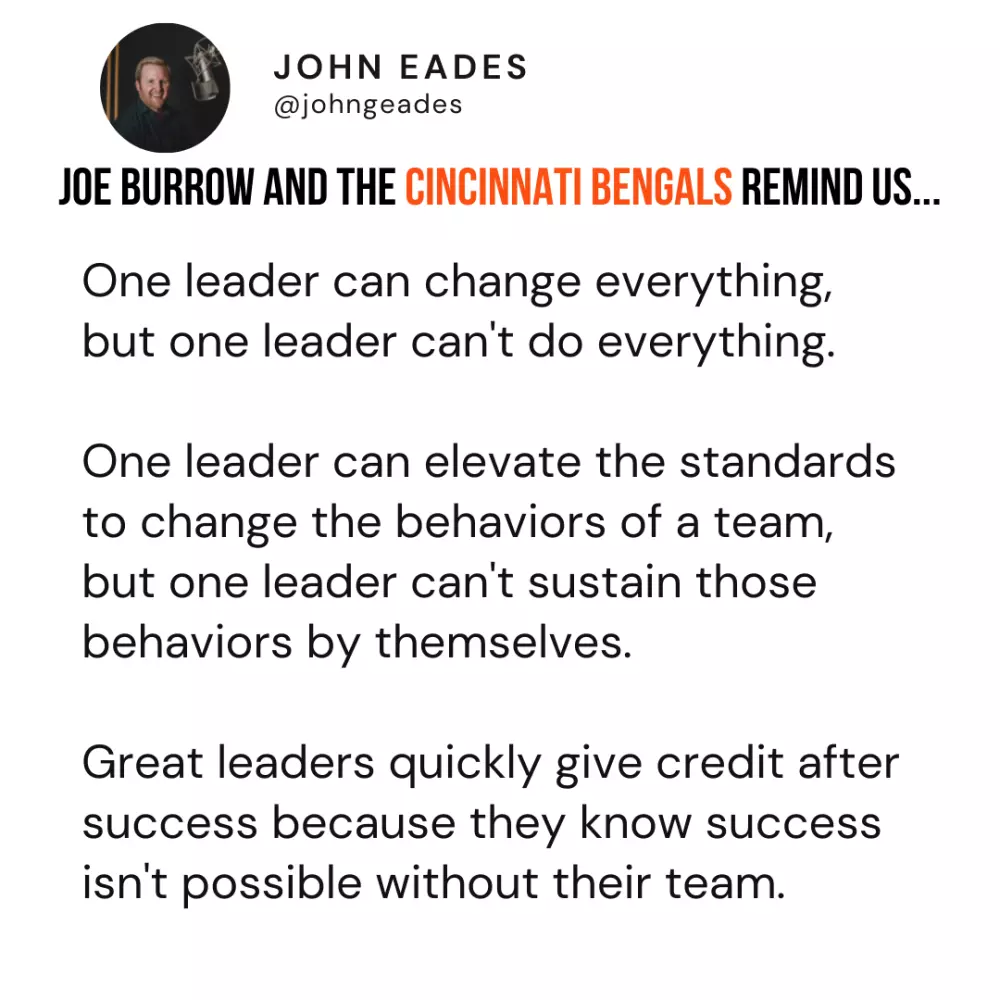Comments
- No comments found

You've got the title; you've got the direct reports; you've got the desire to be a leader and not a manager; yet, when it comes to getting results, your team keeps falling short.
The voluntary turnover is high, the engagement is low, and you end up doing most of the work (or, worse, micromanaging the work) to get the numbers to look acceptable.
It's time to stop hoping and start leading. While each company and situation is slightly different, managers make some fairly common mistakes when leading their team. At the center of many of these mistakes is the belief that your instincts are enough and that leadership should be easy.
Many leadership mistakes stem from the false belief that your instincts are enough and that leadership should be easy.
In Building the Best, I highlight research from Leadership Quarterly. They found that 24% of our leadership ability is genetics, and 76% of that ability is learned or developed.
It's true that instincts or DNA is a proven aspect of leadership. However, genetics by themselves won't mold you into the best leader you can be. Often it requires overcoming simple mistakes through hard work. Mistakes by themselves aren't bad; it's repeated errors that keep us from being the best leader we can be. If you take nothing else away today, let it be this:
Mistakes are meant for learning, not for repeating.
Here are a few common mistakes I have made myself and those I have seen coaching and teaching leaders.

Do you remember how it felt when you got that promotion that was accompanied by a Manager, Supervisor, or Executive title? Chances are, you felt pride, a sense of accomplishment, and a bit of excitement.
While there is nothing wrong with having a new title, there is a good chance it's hurting your ability to lead effectively. Titles are dangerous for those who hold them because they create a distraction from the purpose of leadership; elevating others.
There is a substantial difference between the title of "manager and the actions of a leader.
There's a substantial difference between the title of "manager" and the actions of a leader; one is vastly more important than the other in today's business environment. Many of the primary roles of a manager can be automated and replaced by technology; but, there has never been a more critical time in our history to be a leader.
How to Overcome It: The only time your title matters is on the first day. After that, it’s how you use it. Turn your attention to the primary job of your position and leadership- elevating others. Constantly remind yourself how to do this by serving others instead of yourself. A great way to remember this is what I call the "PTS Method; "Prepare to Serve." Anytime you change environments or Zoom meetings, remind yourself, "prepare to serve."
Taking credit and shifting blame is a mistake made by many leaders to jockey for hierarchical positions. The best leaders are quick to take the blame when things go wrong, and equally as fast to give credit to their team when things go right.
Great leaders take more responsibility for a team's mistakes and less responsibility for a team's success.
How to Overcome It: As Jack Welch famously said, "When you were made a leader you weren't given a crown, you were given the responsibility to bring out the best in others." Get in the habit of recognizing team members daily for their effort and positive attitude. You will be amazed at how your team responds when you give credit and take the blame. It's almost always with better effort and increased responsibility.
I get it, work is coming at your fast, and we don't always have to as leaders to be molders of consensus. There are undoubtedly times when sole decision-making and executing with optimal speed are required. However, try to avoid superseding your team to save time in these situations. This kind of mistake is demoralizing and causes an immediate reaction of resistance from team members.
How to Overcome It: Invite experienced team members into the decision-making process. Ask for their opinion or, better yet, empower them to make the final decision. Provide clear directions and a timeline, and then let them do their job!
Most managers assume they are effective communicators, but in reality the opposite is true. They aren't clear, concise, and conclusive when they communicate, and they struggle to tell stories that inspire.
There has never been a more critical time with hybrid work and multiple communication methods to stop making this excuse and intentionally work on your communication skills. I tell participants in Effective Leadership Communication.
Leaders can make small changes in communication to lead to big changes in performance.
How to Overcome It: One-word managers use to modify an employee's behavior is the word "Don't." Not only is it a micromanaging word, but it's demotivating to people. Here is how managers typically use it:
Writing these statements that start with "don't" exudes a manager trying to control, not inspire. Since inspiration is a key to elevating others, breathing life into team members will help change behavior with an internal trigger instead of an external motivator. Do your best to remove the word "don't" from your communication. See what I did there? "Do your best to… instead of "Don't use don't…." Once inspires you and one is demotivating.
Joe Burrow joined the Cincinnati Bengals as the #1 pick in the 2020 NFL Draft. He is now taking his team to their first Super Bowl (the pinnacle of the sport) for the first time in 33 years. While watching the Bengals underdog victory against the Kansas City Chiefs in the AFC Championship, an essential leadership lesson emerged:
One leader can change everything, but one leader can't do everything.

You might be like Joe Burrow was to the Cincinnati Bengals and be the leader that changed everything in your organization. You might be supremely talented, have incredible skills, and work 120 hours a week, but you can't do everything alone. It's time to stop making this mistake and to empower your people.
How to Overcome It: Don't isolate yourself. Matthew Kelly wrote, "When we isolate ourselves, we don't cut ourselves off from the problems, we cut ourselves off from the solutions." Secondly, ask for help from your team or get a professional coach to challenge and support you. Remember, one leader can change everything, but one leader can't do everything. Said differently, be the leader, not the hero.
Be the leader, not the hero.
I don't know anyone who likes making mistakes; but, it requires significant mental energy and effort to keep from repeating them. A mentor reminded me recently, "a mistake should be your teacher, not your attacker. A mistake is a lesson, not a loss. It is a temporary, necessary detour, not a dead end."
Brush off your mistakes, learn from them, and do your best not to make them again.
John is the CEO of LearnLoft, author of, F.M.L. Standing Out & Being a Leader and host of the 'Follow My Lead' Podcast. He writes or has been featured on Inc.com, LinkedIn Pulse, TrainingIndustry.com, eLearningIndustry.com, CNBC Money, and more. John completed his education at the University of Maryland College.
Leave your comments
Post comment as a guest